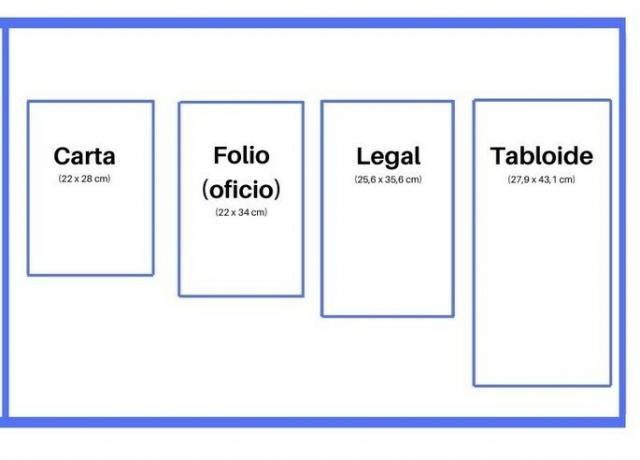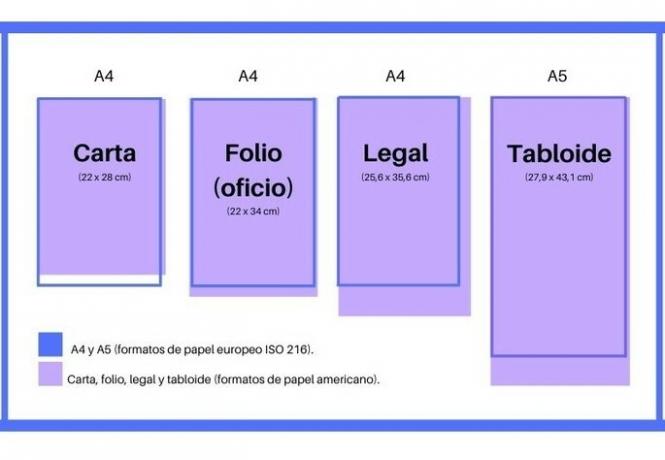Letter, legal, letter, legal, and tabloid paper sizes (size chart)
In the American continent, a system of paper measurements is used that is different from the rest of the world. The types and dimensions of paper on the American scale are:
- Letter
- Oficio (also known as folio)
- Letter
- Legal
- Tabloid
These formats and measures are different from the international standard, known as ISO 216 or European format. However, in many cases "equivalences" are used, such as the use of letter size instead of A4 format (one of the most used in the world), although their measurements are not the same.

Measures of letter size paper, legal, letter, legal and tabloid
| Paper size | Millimeters | Centimeters | Inches |
|---|---|---|---|
| Letter | 220 x 280 mm | 22 x 28 cm | 8.6 x 11 inches |
| Legal (folio) | 220 x 340 mm | 22 x 34 cm | 8.6 x 13.3 inches |
| Letter | 216 x 279 mm | 21.6 x 27.9 cm |
8.5 x 10.9 inches |
| Legal | 216 x 356 mm | 21.6 x 35.6 cm | 8.5 x 14 inches |
| Tabloid | 279.4 x 431.8 mm | 27.9 x 43.1 cm | 11 x 17 inches |
The letter and letter they are almost the same, so they are considered and used as the same format.
Difference between the paper formats of the European system (A4) and the American (letter)

Difference between letter, folio and legal size and DIN A series
In Canada, the United States and almost all Latin American countries letter formats are used, letter, legal and tabloid, based on the American metric system, so the formats are in inches and differ substantially from the world standard, not only in the unit of measurement, but in the proportions of the paper.
This system has been used for decades in the countries mentioned, but it was only in 1995 that the ANSI (American National Standards Institute) included these paper measurements in their classification.
For its part, the European paper size system emerged at the end of the First World War as a practical solution to avoid the waste of this resource.
This system, which was originally called DIN 476, was created by the German engineer Walter Porstmann, who established the sheet formats that today are known as the A, B and C series, of which the most popular is the A series because it contains the most used page measurements on a daily basis, such as the A4 format (used in printers, photocopiers, document drafting, etc.).
You may also like:
- Paper sizes. Understand the difference between A3, A4, letter, legal, and other formats!
- Paper sizes A0, A1, A2, A3, A4, A5, A6, A7, A8, A9, A10
Paper sizes and ISO 216 standard
As the post-war paper measurement system created under the name DIN 476 turned out to be efficient over time, the Organization International Standardization (ISO), in charge of the standardization of norms for the optimization of processes, adopted the system created by Walter Porstmann to create the ISO 216 standard, which for technical reasons is the one he uses almost everywhere in the world, except for the vast majority of the continent American.
This means that the A series paper formats, DIN 476 standard and ISO 216 standard refer to the same.
In many cases, for practical reasons, substitutions are made between American and European system formats. That is the reason why letter size (American system) is often used as a substitute for A4 (European system) and vice versa. However, the measurements between the two are different, and by not knowing these specifications, it is possible to commit errors involving large-scale economic losses (as in the case of the printing or publishing industry).

